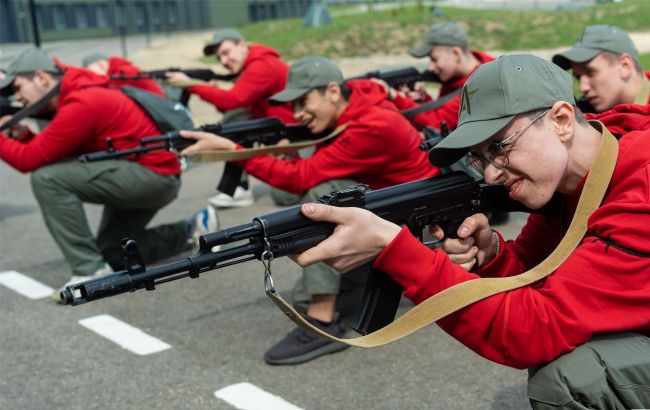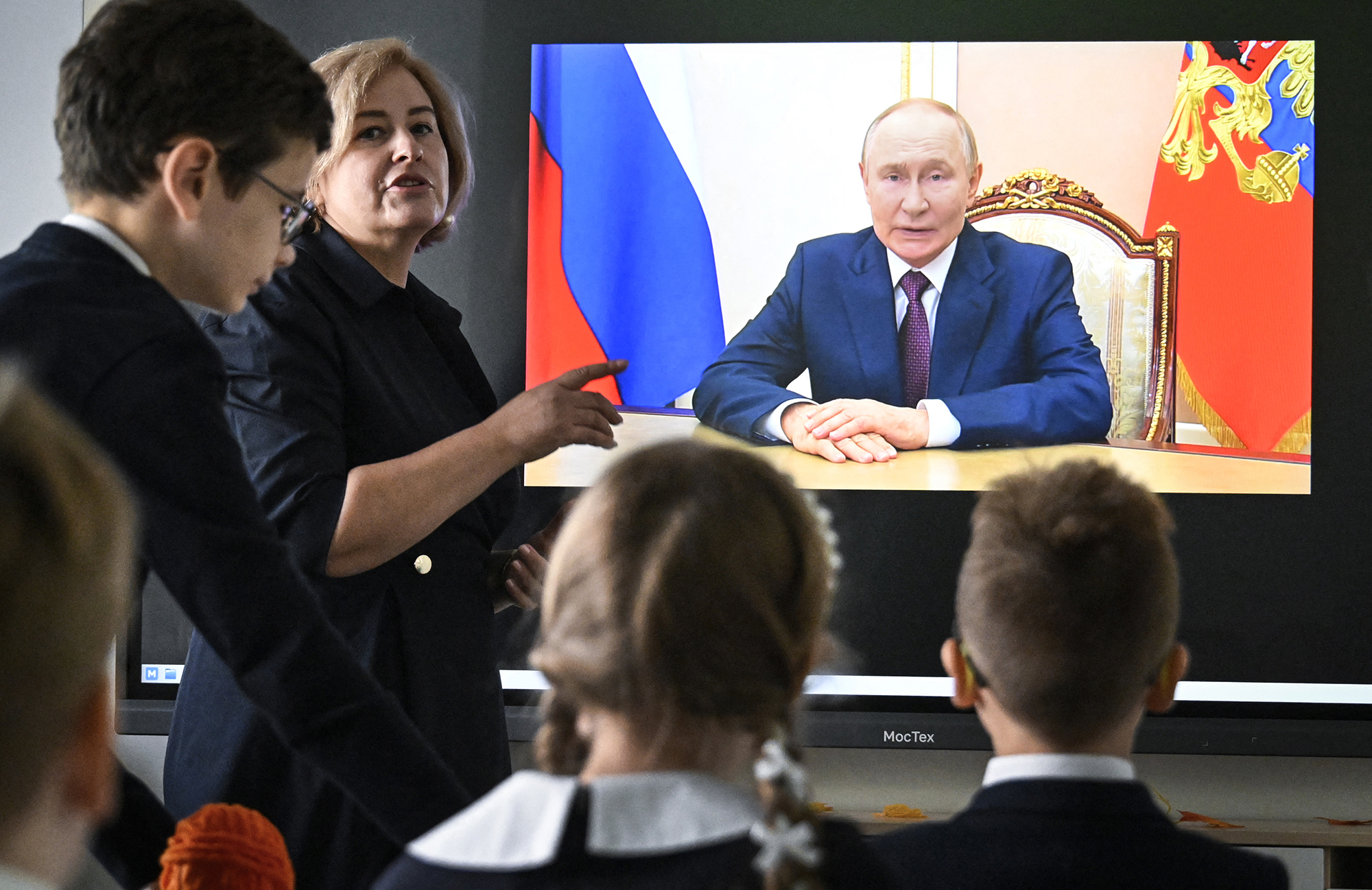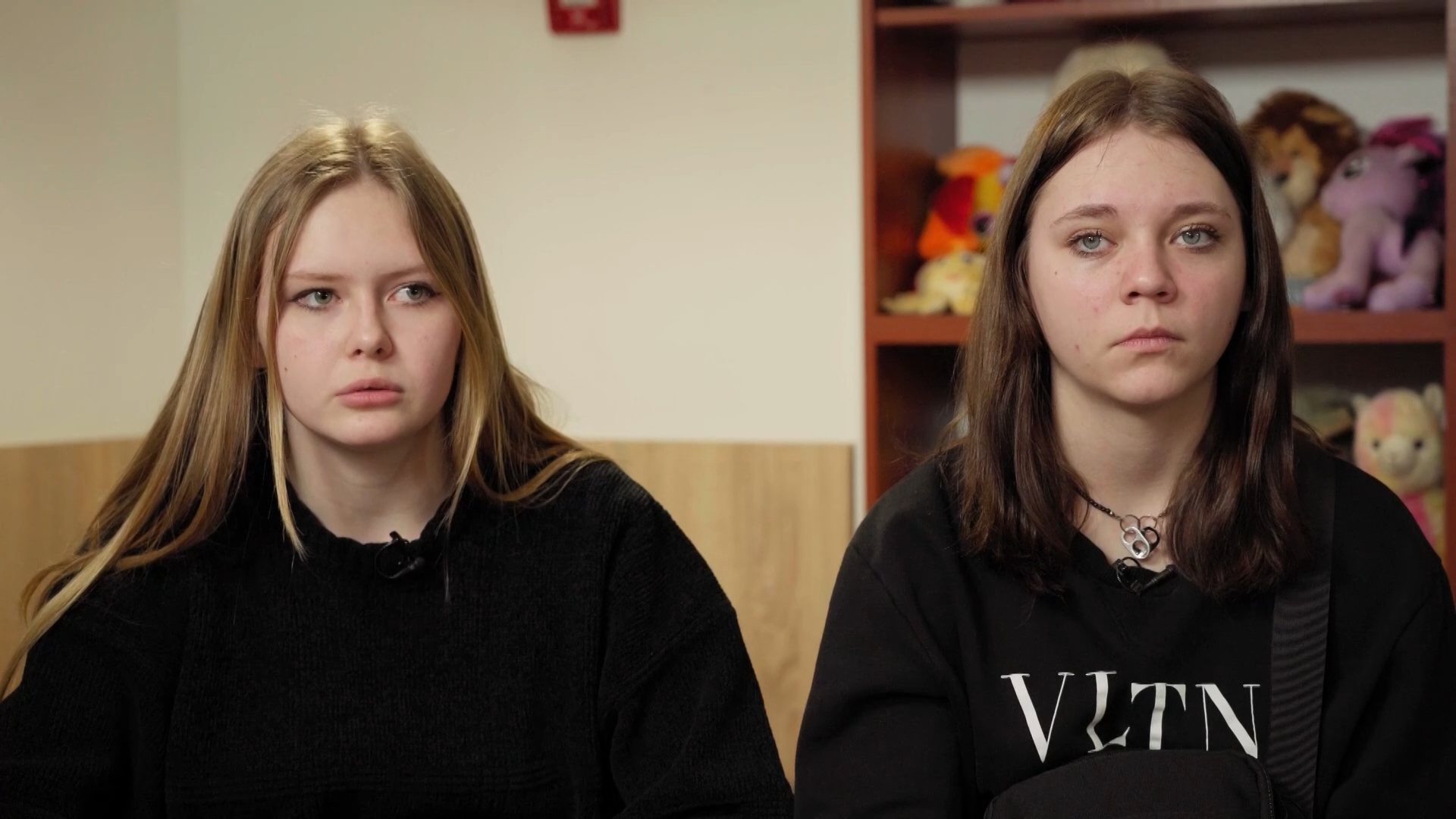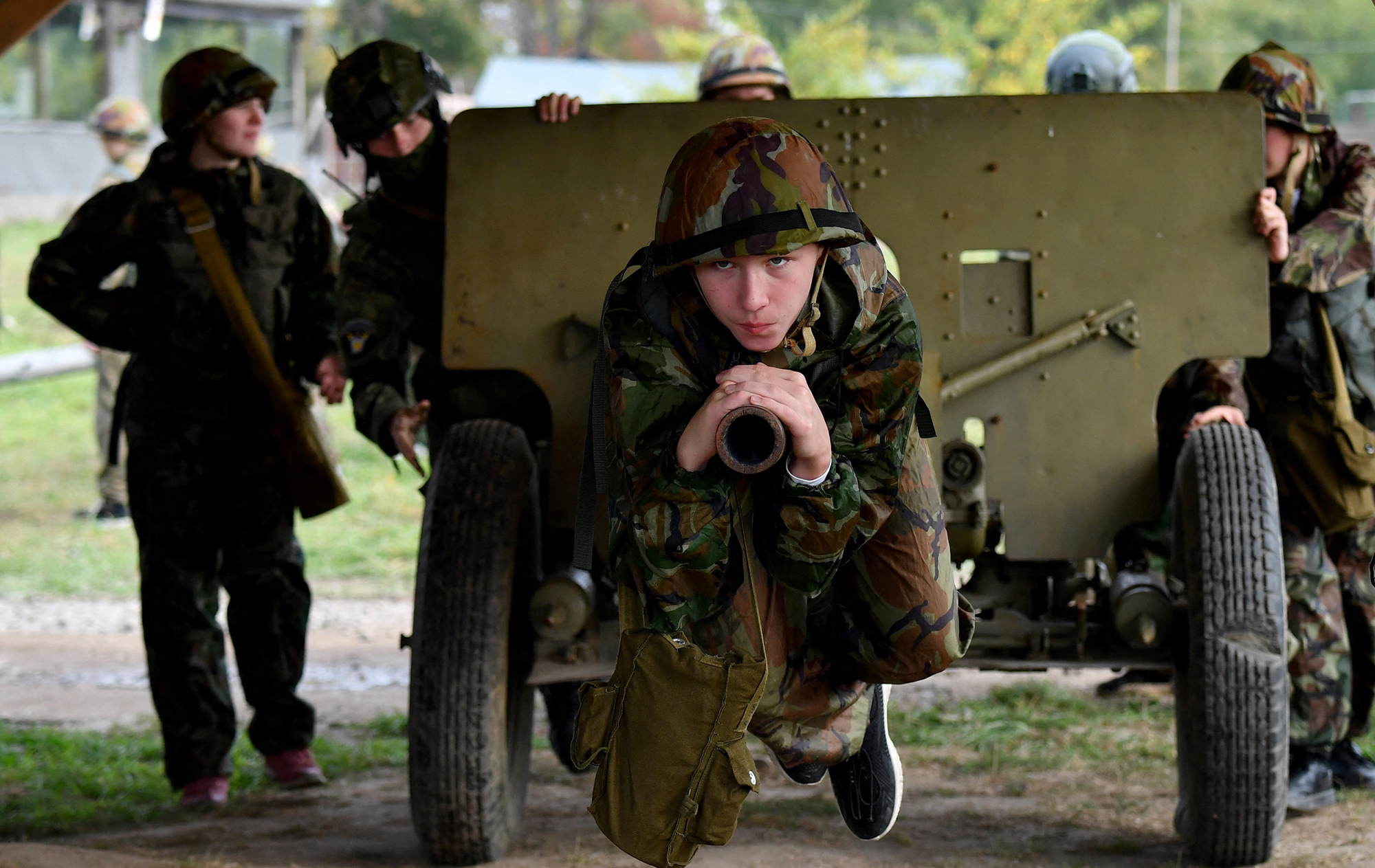Putin's child army: How Kremlin forces Ukrainian kids to serve Russia
 Military training of children in temporarily occupied territories (photo: social networks of the Avangard educational and methodological center)
Military training of children in temporarily occupied territories (photo: social networks of the Avangard educational and methodological center)
Russia forces Ukrainian children to join the Youth Army units so they can fight against Ukraine. What is ideological processing by Kremlin propaganda, and how a child becomes an obedient tool in the hands of Russian authorities - read in the article by RBC-Ukraine.
Over the three and a half years of full-scale war, Russia has stolen hundreds of thousands of Ukrainian children. Some of them were deported to the Russian territory, while others are being held in occupation.
For Russians, children are a valuable resource because they are much easier to manipulate and control. Ukrainian children are being indoctrinated with a reality created by Russian propaganda. In that version of reality, Ukraine attacked Donbas, and Russian soldiers are defending Russian-speaking Ukrainians.
In parallel, children are taught to defend the motherland, naturally meaning Russia. After some time, a child who believes that Ukraine is the antagonist is invited to join the ranks of the Russian Youth Army. A child raised on propaganda yesterday becomes a convenient tool in the Kremlin's war against Ukraine today.
"Great country"
Most of the Donetsk and Luhansk regions, along with Crimea, have been occupied for 11 years. During this time, a generation of children has grown up - in 2014, they were 10 years old, and now they are over 20. All these 11 formative years, they lived under the concentration of Russian propaganda.
The Kremlin spends enormous sums to maintain a high level of pro-Russian narratives in the occupied territories. For the Russian political leadership, it is critically important to impose its agenda on people living under occupation. Those who refuse to believe in it and resist in any way are punished - thrown into basements, imprisoned, tortured, and killed - and all of this is done demonstratively. The rest are actively worked on.
Like any country with imperial ambitions, Russia pays special attention to children. It’s hard to convince an adult who has spent most of their conscious years in free Ukraine that Kyiv bombed Mariupol - they know it’s not true, they can connect logical dots, think critically. Ultimately, an adult trusts what they see and has their own lived experience.
But a child is much easier to deceive. Russians use dozens of different tools to make Ukrainian children loyal to the occupation authorities - from complete disorientation and stress to endlessly repeated propaganda narratives. But to turn a child into an obedient and devoted soldier, the necessary foundation must be laid.
 Putin is shown on TV to schoolchildren (photo: Getty Images)
Putin is shown on TV to schoolchildren (photo: Getty Images)
The most convenient platform for promoting the “Russian world” to children is the school. A child is used to seeing adults in educational institutions as authoritative figures who must be obeyed. The occupation authorities strictly monitor that teachers in schools follow the Russian educational program. If not, the teacher is replaced. Often, teachers are brought from Russia, and they have no problem teaching children history from Vladimir Medinsky’s textbooks.
Elements of propaganda are embedded into every aspect of a child’s upbringing, surrounding them with lies. The child must hear everywhere - at school, in clubs, at sports competitions, at home, on TV, and from friends in the yard - that Ukraine bombed Donbas, and that Russian troops are protecting Russian-speakers.
In various forms, with different words and images, this message is delivered. After a while, these narratives literally become part of the child’s everyday life, and therefore, something normal and acceptable. Special attention is given to the idea that Russia not only saved Russian-speakers, but is a great and best country, and that being a part of it is a great honor. Even more prestigious is to die for Russia.
“Propaganda is in Russians’ blood, in their genes. They live by it and it’s effective. Right now, they’re trying to raise a new generation of mankurts who will do anything for them. At least, that’s their hope. They essentially give these kids no choice because they constantly push a single point of view - that Russia is a ‘great country.’ At some point, the child starts to believe it,” says Andrii Chernyak, Representative of Ukraine’s Defense Intelligence, in a comment to RBC-Ukraine.
There is another propaganda tool that is not as effective as the so-called “soft power” in schools, but also has its advantages. Ukrainian children who were taken to camps in occupied Crimea or in Russia itself are often simply humiliated. The goal is to create a maximum stress environment in which the child breaks down and finally loses all hope. Not every adult can maintain composure and sanity in hopeless situations - let alone a child.
“We were told directly - you're like in prison here, you don't have your own opinion. There’s only ours, and the wrong one. Astakhov told us all Ukrainians are kh*khols. He called us Nazis, fascists, and pots. He cursed at us, said we were stupid. They forced us to learn the song ‘Forward, Russia’, and it got stuck in our heads,” share Taia and Zhenia, who were returned from Russia to Ukraine as part of the Bring Kids Back UA initiative.
 Taia and Zhenia (photo: screenshot from Bring Kids Back UA interview)
Taia and Zhenia (photo: screenshot from Bring Kids Back UA interview)
According to Ukrainian human rights defenders, around 1.5 million Ukrainian children may currently be under Russian occupation. They are being influenced, lied to, and convinced that Ukraine is the enemy with whom they must fight.
Propaganda about important
Once the foundation is laid and the child is convinced they are part of a great country and that Ukraine wants to kill them, it’s time to move forward. So-called patriotic education is conducted in parallel with pseudo-history lessons, but over time, the former receives special emphasis. The focus shifts - the child is no longer just being taught to love the motherland - they are now being taught how to defend it.
“There weren’t any real events, but when the top military man came, they forced us to wear Russian uniforms, handed out texts, and made us sing the Russian national anthem. I tore up the texts and refused to sing. They kept telling me - we’ll send you to a Russian foster family, you’ll never go home again, there will be no way back,” says 16-year-old Artem, who was deported to Russia but eventually returned home.
In the occupied territories, just like in Russia, children are subjected to “Conversations about important things.” Initially introduced as an elective, these have become weekly events. Every Monday before lessons, a Russian soldier visits and tells the kids how important it is to serve in the army. He talks about external enemies, about Russia’s greatness, about how everyone wants to attack it, and how Russia will defend everyone. No one checks the soldier’s background, so Russian opposition media have repeatedly documented that those giving such talks in schools include individuals convicted of pedophilia, for instance.
“Children are forced to sing the Russian anthem, hang Russian flags, and participate in events glorifying the Russian army. Schools push participation in patriotic clubs and activities that devalue everything Ukrainian. Mandatory propaganda lessons, ‘Conversations about important things,’ are introduced, where children are taught from an early age to hate Ukraine and justify the war,” adds Daria Herasymchuk, Ukraine’s Commissioner for Children’s Rights, in a comment to RBC-Ukraine.
From elementary school, children are taught that war is sacred, and dying in it is an honor and great nobility. This message is slipped into nearly every lesson, wherever possible. While some children draw pictures for Russian soldiers, others write them letters.
 Military training in schools (photo: Getty Images)
Military training in schools (photo: Getty Images)
“Instead of essays in Russian language or literature classes, write a letter to a hero. February or March this year (referring to 2024 - ed.), they were writing every day: ‘Your heroism is priceless,’ ‘Thanks to you, I can study.’ And it was all copy-paste. One day, my son’s classmate asked when it would end. The homeroom teacher yelled at him: ‘Write the letter, you're not a Banderite!’” shares a resident of occupied Donetsk with Radio Liberty.
In addition, children are given lessons in so-called defense of the homeland. They’re taught to disassemble and reassemble assault rifles, provide first aid, and even assemble drones. They wear uniforms, are visited by soldiers who resemble movie heroes, and are engaged in interactive activities with contests and prizes. Small kids, who enjoy any kind of activity, are easily drawn in.
They are also told about the Youth Army, which they can join to contribute to defending Russia from external threats. Since the beginning of the full-scale war, the Kremlin has lowered the entry age for the Youth Army from 14 to 8 years old, so war propaganda begins practically from first grade. By the time a child enters middle school, they are often already willing to be part of the army – just like their father and grandfather, as they’re constantly told.
“Even Soviet propaganda was extremely effective. So much so that young men were ready to go to Afghanistan to fulfill their international duty.’ The same thing is happening now. The Russians are fairly lazy - they didn’t even rewrite the manuals. They just removed ‘Communist Party of the Soviet Union’ and added ‘Great Russia,’” noted Andrii Chernyak, Representative of Ukraine’s Defense Intelligence.
"We are learning - and you?"
The military-patriotic movement Youth Army was created in Russia in 2016 at the initiative of then-Minister of Defense Sergei Shoigu. From the very beginning, it was compared to the infamous Hitler Youth, and the similarities are indeed many. First and foremost, it's about ideological indoctrination of children - they are taught from early childhood to be loyal to Russia, although Russia in this context really means loyalty to the state authority. All orders of the authorities must be obeyed, and doubting those decisions is considered treason, as is any form of dissent.
The Youth Army itself openly states that it "forms a positive motivation to fulfill constitutional duty and prepares young men for service in the Armed Forces of the Russian Federation." Just like in the Hitler Youth, members wear uniforms, and while enrollment isn’t mandatory, schools pressure children and parents to join, and teachers get bonuses from the authorities for this.
The first Youth Army branches appeared in occupied Crimea in 2016. By January 2022, there were already about 29,000 members on the peninsula - a figure proudly reported by Russia's Ministry of Defense.
Youth Army expanded into eastern Ukraine after 2022, when Russia illegally included the Donetsk and Luhansk regions into its constitution. Even before that, the Kremlin had been trying to involve children from Donetsk and Luhansk in various militarized youth movements - among them the Young Guard - Youth Army. But since the beginning of the full-scale war, the number of Youth Army members in the occupied territories has grown. As a result, by 2024, children from the Luhansk region were marching in Moscow’s May military parade as part of the Youth Army.
 Military training for children in the temporarily occupied territories (photo: social media of the Avangard educational and methodological center)
Military training for children in the temporarily occupied territories (photo: social media of the Avangard educational and methodological center)
In the Donetsk region, the Youth Army organizers are actively carrying out ideological indoctrination of children. Their social media channels are filled with hundreds of events: trips of Ukrainian children to the Caucasus, where they pose in military uniforms on top of Mount Elbrus, forums, combat training sessions, and more.
“At the Youth Army Training Center, Shakhtarsk House of the Youth Army, the Head of the Shakhtarsk Youth Army HQ of the Donetsk People’s Republic conducted a firearms training session. The boys practiced disassembling and assembling an assault rifle. We are learning - AND YOU?!” says a post in the Youth Army of the Donetsk People’s Republic group on Telegram.
As part of their activities, the Youth Army members regularly visit wounded Russian soldiers in hospitals, distribute water around Donetsk, clean up graves of soldiers, and stand guard at the monument to Ossetian terrorist Oleg Mamiev, also known by the call sign Mamai.
This intense propaganda leads, unfortunately, to many children going even further. Upon turning 18, they sign contracts with the Russian army and fully take part in the war against their own country. Journalists have already documented dozens of cases where yesterday’s Ukrainian child is now fighting against Ukraine with a weapon in hand.
One notable example is Ilya Zozulsky, a Crimean-born man from the village of Poltavka. As a child, he joined the Youth Army. Today, he is 23 years old, serving as a Russian artilleryman, and has already been awarded the Zhukov Medal. In a Russian propaganda comment, his mother said she worries about her son, but is very proud of him, because “he is doing his duty.” Duty to whom and for what - she did not clarify.
“Ilya’s father was a soldier, and he wanted to follow in his footsteps since childhood. After 2014, Russia returned to Crimea, and with it came the Youth Army. Ilya joined the organization and became a mentor. Now he’s one of 50 such Yunarmiya mentors fighting on the fields of the Special Military Operation (war in Ukraine - ed.),” the woman said in a comment to Russian state TV.
In May, a new Youth Army branch was opened in occupied Mariupol, and 30 schoolchildren were inducted as members. The event was held under the slogan “Opening New Horizons.” Later, a monument was unveiled for Eduard Diakonov, a 20-year-old Russian soldier who allegedly covered the grenade with his body while “liberating” Mariupol. Children were told about the heroism of Eduard and assigned to stand honor guard at the site.
Similar events are taking place in the occupied parts of the Kherson and Zaporizhzhia regions. From there, Russia has already recruited hundreds of children into its Youth Army.
If we look at the big picture, what emerges is a typical Soviet-style military-patriotic education system - only this time, Ukrainians are being branded as Nazis. And the longer these territories remain under Russian occupation, the more Ukrainian children will come to believe it.

